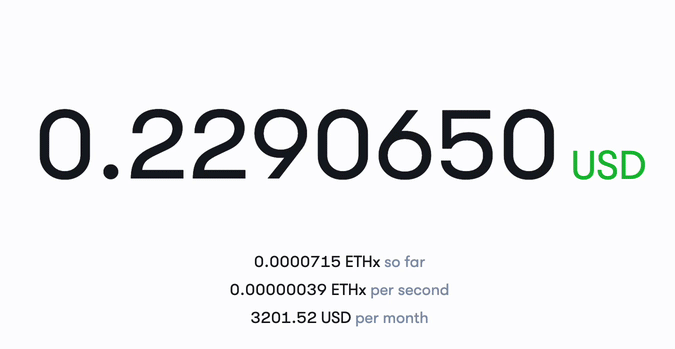DeFi’s Role in the Future of Finance
Can we think long term for a second?
Why does DeFi have a place in the future?
Some argue that the decentralization & censorship resistance that DeFi offers is enough to justify its value. I’d agree that the privacy preserving nature of DeFi is an end in itself. But if it’s only valuable for the sake of censorship resistance, then will decentralized finance really reach its full potential? If we fail to build things that are used by much of the everyday financial system, the answer is no.
So if we set aside some of the (extremely important) use cases around privacy and censorship resistance, why else is DeFi valuable? It’s worth thinking through other areas where DeFi will improve finance. I’ll highlight three: automation, programmability, and global inclusion.
Automation
Banks spend a lot of money. In the average American city, most skyscrapers don the logo of a financial institution. I used to live downtown Cincinnati - a good old fashioned mid-sized American midwestern town. My apartment had a view of the city skyline - where I every evening I could watch the sun set behind a litany of tall buildings with bank and insurance names plastered to the top.
Why do banks do this? Banks want your trust. Putting your name on a skyscraper gives you legitimacy. This legitimacy cements them as among the most trusted and holy institutions in modern society.
Uniswap is a decentralized exchange that can do its thing with essentially zero capital expenditures and a headcount that rounds to zero when compared with the a typical financial services company. They’ve processed over $1T in volume since their inception just a few short years ago. There’s no Uniswap building, and there probably never will be. Let’s compare Uniswap’s capital expenditures against traditional finance and centralized crypto exchanges.
The grandaddy of them all, JPMorganChase, has 73.8 million square feet of real estate that it owns or leases and 271,025 employees.
Intercontinental Exchange (ICE) - which owns the NYSE and several other exchanges - has 3.2M square feet of real estate and 8,858 employees.
(source: ICE and JPM’s 2021 10-K)
Coinbase is more lightweight than a traditional financial company, but not as much as a DeFi protocol. They staff 3,730 employees, and have no corporate HQ (though they did spend $34M in annual lease costs for satellite offices).
Uniswap has 100 employees (most of which were hired in the last 12 months) and (I think) a single small office in NY. At MOST they’re spending high 6 figures/low 7 figures in lease expenses.
Uniswap can move a trillion dollars in value with a tiny, tiny fraction of the total expenditures of a traditional financial institution. Sure, JPM moves many a trillion each year, but if you were to break down volume per employee, Uniswap would win by a large margin. And if we consider the largest total project in all of crypto, we owe its creation to what is likely one person - Satoshi Nakamoto.
You could argue that some of JPM and ICE’s employees are there for regulatory reasons. But can JPM really be staffing 200k+ compliance and law professionals? No way.
Here’s the punchline: DeFi protocols are going to enable intelligent finance professionals and opportunistic firms to provide better financial products at lower cost. The cost savings are going to be given back to users in the form of lower fees, better rates (i.e. 3% in your savings account instead of 0.001%), more opportunities to compound & access capital, and 24/7 service (DeFi does not sleep).
Programmability
Smart contracts will not only enable automation, but programmability.
Programmable Cash Flows
We have money streaming - the ability to send recurring payments on a per second basis continuously, as opposed to separate, discrete transfers. Money streaming allows us to automate the process of sending a recurring payment by executing a single transaction to keep a recurring payment open for an arbitrary amount of time. With streams, you can also create reactive smart contracts which can listen for streams and redirect them to other addresses. You can imagine a world of interconnected cash flows - bouncing from account to account in a Superfluid economy (:

NFTs as the Optimal Proof of Ownership
If crypto itself is a means of “reducing error in the database that is money,” you can think of NFTs as subset of this that reduces error in the database that is ownership. The process of transferring a home or car title in the US is insanely complex on the back end. There are high fees, rent seeking government agencies, and titling companies in the middle of a process which could be as simple as calling transfer on an ERC721.
The same goes for IP as a category. There are efforts to take art, music, and patents on chain in the form of NFTs. We’ve seen everything from digital art to biotech patents get tokenized.
Everything else on chain
We’ll see subscriptions, salaries, cap tables, social tokens, and internet services go on chain in the future. In some areas, the law will catch up with the innovation and make the entire process much simpler. Jurisdictions that accept payroll taxes in Superfluid streams will get their tax payments in real time, countries that allow companies to put cap tables on chain will have greater transparency and programmability within their capital markets, and when NFTs are protected as IP we’ll see a Cambrian explosion of applications built to allow creators to monetize and financialize these tokens.
Global Inclusion
Banking the Unbanked
Even if the system is still suboptimal, most of the western world doesn’t have to worry that much about basic financial services. But what about the ~25% of the world that still does not have a bank account. Even for remittances - Western Union still charges exorbitant fees for international wire transfers - money which comes straight from the pockets of families that need that money dearly in developing nations.
Stablecoins solve this. DAI and USDC provide citizens all over the world with a near equivalent to a dollar denominated bank account. Dollars aren’t perfect, but they’re a hell of a lot better than the Argentinian peso or Zimbabwean dollar.
Access to Capital & Financial Services
What’s less obvious is the importance of both global financial services & access to global capital. Insurance, DEXs, and derivatives will all be important for developing markets. The same applies for raising capital in the form of equity sales and debt issuance. Silicon Valley is no longer a place, it’s more of an idea: people are getting funded from everywhere, and crypto is making this easier with stablecoin payments and in some countries, on chain cap tables.
Raising money internationally via debt is a bit less prevalent in developing countries, but crypto is also making this possible. You see in platforms like Goldfinch that investors around the globe are able to provide liquidity to a lending pool which provides funds to businesses in the Global South. African small businesses & tech startups are being funded on goldfinch in a way that would not be possible through traditional means.
The Opportunity is Still Here
DeFi is still early and we’re in a crypto bear market, but these are the best times to get involved. I’d recommend diving in - read white papers, go to meetups, and consider learning to code (if only to better understand the underlying technology). Just because there has been froth and frivolous projects, does not mean that this industry is not important or innovative. It is.
If you work in DeFi, you should consider talking with people in traditional finance. We need to build bridges between existing players and DeFi where possible. And I don’t mean this in the buzzwordy way of “bridging the gap between web2 and web3.” I mean reaching out to people who may be on the fence about crypto in general - the people who may be skeptical about crypto, and taking some of their feedback to heart. Maybe (or probably) they’re turned off by some of the bad behavior we’ve seen in the space. Should we really be shocked?
Seeking to understand their business will have a positive impact on what we do next. It will allow DeFi to understand where they need to focus to get institutional adoption - even if it minds going around or out-innovating many of these institutions (:
Much of what we’re building in DeFi is making some of the same mistakes that were made in the early development of the modern financial system. If you’re building a rocket company, you don’t necessarily need to have a full understanding of rocket history to succeed. A new breakthrough in physics and engineering speaks for itself. But understanding the history of finance does matter for DeFi because finance is a social technology. Crypto is inherently political - it’s about how people should store and transfer value, and that’s a really big deal. It’s the kind of thing you can only hope to understand by taking a deep look at human nature.
We’ll need to build systems which are clearly better than the alternative to reach our potential. Censorship resistance is already a massive breakthrough that we should be very proud of, but we need to make sure that these systems are superior to what already exists on more axes than just decentralization if we want adoption.
We need to build global, censorship resistant, automated systems which enable new applications that we’ve never seen before and at lower cost - so we can all compound capital faster, expand the amount of business we can do with one another, and make the world a wealthier place.




